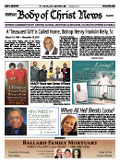Good Anger, Bad Anger
How do you handle anger? It says a lot about the kind of person you are. Jacob’s sons Simeon and Levi apparently were so controlled by anger that their father cursed them for it (Gen. 49:7).
Anger is like fire. When handled appropriately, it can bring about great good. But out of control it can destroy people’s lives. Jesus became angry when religious leaders tried to prevent Him from helping a disabled person because of their religious traditions (Mark 3:5).
Later, Paul cited Ps. 4:4 in exhorting us to “be angry and do not sin” (Eph. 4:26). And Hebrews says that the Holy Spirit was angry at the deadening effects of sin on the Hebrew patriarchs (Heb. 3:7-19).
So then, anger can be used for good. But what makes for “good anger”? Here are some characteristics to consider:
Good anger often is a response to an injustice or something destructive. Example, Jesus responded with anger over the misuse of the temple and the abuse of God’s people (John 2:13-17; compare Is. 10:1-2). His anger was not self-serving or vindictive; actually it served a purpose of mercy.
A similar example of good anger can be seen in God’s expression of wrath against sin. His judgment fell on Christ, who bore our judgment (John 3:16-17).
Good anger is slow to develop but increases as it encounters more and more wrong. (Is. 4:4; Nah. 1:1-11; James 1:19). Once anger is recognized, we should act on it instead of harbouring it and allowing it to fester and become destructive (Mic. 7:18; Eph. 4:26-27).
Good anger acts and then forgives; it doesn’t keep a scorecard of past wrongs (Ps. 103:9; – 1 Cor. 13:5). Good anger is rooted in a sustained and thoughtful understanding of justice and mercy (Zech. 1:1-15), By contrast, impulsive anger is dangerous and should be avoided (Prov. 22:24; 29:22; 1 Cor. 13:5).
Whether good or bad, anger is powerful (Ps. 18:7, Prov. 27:4; Jer. 10:10, so it needs to be harnessed and used with a calculated intent for good (Eph. 4:26).
Some folks live with lifelong consequences for choices made in a moment of passion of foolishness. Moses is a good example. In a sudden and rare display of anger, he hit out at the rock, now that would seem a very innocent and harmless act. Yet it cost him entrance into the Promised Land (Num. 20:10-12).
Why did Moses strike the rock, rather then speak to it as God had commanded? This question is worth giving thought to, because Moses’ life turned on this incident. And if Moses, who was described a most humble man, and the greatest prophet of Israel ( Deut. 34:10), could fall so far and so quickly, what about the rest of us?
Aren’t we also at risk of making sudden choices that we may regret the rest of our lives? How can we avoid this type of life changing anger?
In the end, only Moses can answer why he struck the rock. Yet, it seems clear that he was acting out of anger, which was out of character for him. For years Moses patiently put up with the Israelites, instead of lashing out at them, he interceded with God time and again, pleading for the Lord to have mercy on His people. What, then, was the source of the anger that boiled over at the waters of Meribah? Some of the possibility could have been carried from his early life with deep wounds. Is there a lesson here for the rest of us?
It would seem that deep, unresolved anger and other emotions can leave us vulnerable. Ordinarily we may be able to keep things under control. But under certain circumstances, we are liable to act on impulse and do things that we deeply regret later on.
The problem is not just our past, but our failure to bring the past to the Lord for perspective and healing. The Lord, judged Moses because, for whatever reason, he failed to believe God and honor Him before the people (Num. 20:12).
What is it that has the potential to keep you from obeying and fearing the Lord? Whatever it is, whether it is from your past or present – it needs to be dealt with so you can love and serve the Lord with all that you are and have. (Deut. 6:5).
Evangelist Dr. P.M. Wynn Grove can be viewed weekly on Channel 53 (Denver) LeSea Broadcast Sunday @ 4:00 p.m. and channel 51 & 6 (Colorado Springs) LeSea, Sunday @ 10:00 a.m., or email her at pmwynn9@msn.com.



 And this is the will of him that sent me, that everyone which seeth the Son,
and believeth in him, may have everlasting life; and I will raise him up on the
And this is the will of him that sent me, that everyone which seeth the Son,
and believeth in him, may have everlasting life; and I will raise him up on the